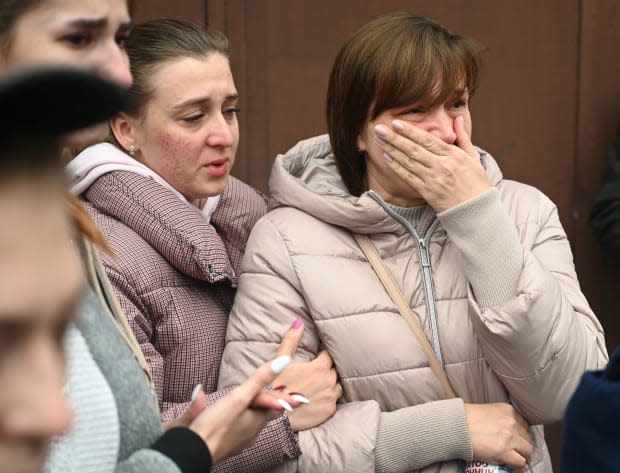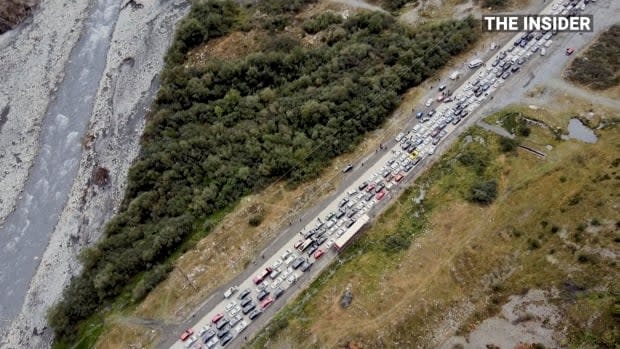As masses flee Russia to avoid conscription, European neighbours grapple with whether to let them in

The chaos at Russia's borders is intensifying as hundreds of thousands of men try to get out of the country and avoid being dragged into fighting Vladimir Putin's war in Ukraine.
Some reports from border crossings with Georgia, Finland and other areas indicate Russian authorities moved Tuesday to stop — and then enlist — some of those trying to escape. The exodus is raising difficult questions in Europe and beyond about whether to welcome the draft dodgers, or turn them back in the hopes of creating more social unrest in Russia.
Evgeny, a 28-year-old photographer from Moscow, says people such as him are victims, too.
"I think they should let Russians in," he told CBC News as he walked the last 20 kilometres to the Georgia-Russia border crossing at Verkhny Lars to avoid a huge traffic jam of vehicles trying to cross.
"People are fleeing under very dire circumstances, many are saving their lives. (They) do not want to fight in this imperialistic, pointless war."
WATCH | Russians flee the country to avoid conscription:
'They will simply arrest you and put you in jail'
When Russia first invaded Ukraine on Feb. 24, Evgeny, who asked CBC News not to use his last name for his family's safety, said he participated in an anti-war demonstration in Moscow — but the experience left him demoralized.
"People were too scared. There were fully armed and very experienced policemen who knew well how to stop the protesters. Such protest rallies dissolve because people are frightened. And it's not something that gives you hope."
After that, he says he tried to carry on with his life until the possibility of getting drafted pushed him to take his chances at the border.
Other men interviewed by CBC News at the Russia-Georgia border crossing spoke of a similar dilemma about whether to leave or stay in Russia.
Alexander, who travelled from the Muslim-dominant region of Tatarstan, said he would have left long ago, except he had to stay to earn enough money to afford the trip. He said he either sold or gave away everything he owned to pay for the journey to Georgia and to have money to live on when he arrived.
"It is not possible to stay and fight this against our regime," said Alexander, who also asked CBC not to use his last name.
"If you have anything negative to say they will simply arrest you and put you in jail."

Opposition to the draft
Novaya Gazeta, formerly Russia's leading independent newspaper and now publishing from exile in Latvia, reported Tuesday that Moscow police arrested one demonstrator and then raped him in jail to send a message to other protestors.
There have been reports of at least a dozen Russian conscription offices being attacked or fire bombed.
In some of Russia's most impoverished republics, such as Dagestan, opposition to the draft has been the most intense. There have been daily protests with dozens of arrests in the capital of Makhachkala. One video on social media shows a group of women in Makhachkala chasing away a police officer who was trying to sign up local men.
Russia's war casualties have come disproportionately from impoverished, ethnically diverse parts of the country, especially in Siberia and the Caucasus Mountains region, which includes Dagestan.

Officially, Kremlin officials and others involved with the mobilization claim the protests are an anomaly, and by and large, most men are willing to answer the call to go and fight.
The challenges of raising money and the difficulties of leaving family behind was repeatedly mentioned by many of those who spoke to CBC News as an explanation for why they waited almost nine months to get out of the country. None of those who spoke to CBC News wanted their last names used as they feared there could be repercussions against friends and family at home.
"This is my second trip to Georgia," said another man named Alex, who appeared to be in his mid-40s and said he used to work in Moscow as a software developer.

Alex said he initially left Russia in March but returned to visit his family.
He said Putin's announcement of a so-called "partial mobilization," that has seen hundreds of thousands of Russian men drafted into the army, was the trigger that forced him back to the Georgian capital, Tbilisi.
"Now is a critical moment. Everybody has just decided to run away."
Hundreds of thousands of Russian men have fled: reports
How long Russia will allow those exits to remain open, however, is unclear.
There were unconfirmed reports Tuesday that its military has moved equipment such as trucks and armoured personnel carriers to the crossing point with the intention of setting up a mobile recruiting office, allegedly to snap up the men as they try to leave.
Video circulating on social media showed several armoured vehicles arriving at the Verkhny Lars crossing. Earlier, satellite photographs showed a line of vehicles that stretched back into Russia for nearly 20 kilometres.

Russian media, quoting government sources, have reported that as of this past weekend, more than 260,000 Russian men have fled.
Authorities in Kazakhstan, which shares an almost 8,000 kilometre land border with Russia in Central Asia, said as of Tuesday almost 100,000 Russian men have crossed over into that country. And in a show of defiance to Moscow, Kazakhstan's President Kassym-Jomart Tokayev said the men are fleeing a "hopeless situation" and must be cared for.
Elsewhere in Europe, however, the reception for the fleeing Russians has been mixed.
Finland, Poland and the Baltic States of Estonia, Latvia and Lithuania have said they will not give automatic asylum to Russian men trying to escape the draft, suggesting that the influx could create political instability.
Germany, however, says it will consider accepting the Russian draft dodgers.
'We should welcome refugees no matter how they come'
Sergey Radchenko, a Russian history professor who teaches at Cardiff University, says he tends to come down on the side of the argument that says Europeans should treat the Russian draft dodgers with compassion.
"I do not think that those people who call for Russians to rise up — and blame them for not rising up — against a brutal dictatorship, I don't think they have the moral standing to make this argument," Radchenko told CBC News.
"I am generally in favour of those who say let's look at this on a case-by-case basis and we should welcome refugees no matter how they come."
So far, he notes Putin's regime has not closed the exit routes from the country — which may be a way to get rid of people who could be unreliable or dissenters who could lower the general morale of the army.
"If Russia does close the borders on their side then we will know that keeping them open on our side is the right thing to do," said Radchenko.

Britain's Ministry of Defence has said many of the new recruits are already being rushed to forward bases in Russian-occupied Ukraine without any training or proper equipment.
One soldier who was just drafted days ago, wrote in a social media post that he was attached to Russia's 1st Tank Regiment.
"We were officially told there would be no training before going to the front," he wrote. "The regiment commander confirmed this information that on the (Sept.) 29th we will go to Kherson."
Another video has emerged of a Russian training officer addressing new recruits and telling newly mobilized men that they will need to provide their own sleeping bags, and medical packs — and that they should go to pharmacies to buy feminine protection to take with them to use as bandages, as Russia's military has none to provide.

